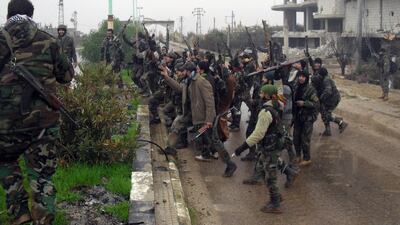BEIRUT // A series of Syrian government offensives days ahead of planned peace talks have placed the negotiations in serious doubt with the opposition saying it would not attend unless there is some respite.
As part of a UN-brokered plan to reach a ceasefire and ultimately a political settlement to Syria’s nearly five-year war, government and opposition delegations are scheduled to begin talks in Geneva on Friday.
But on Sunday, Syrian government troops captured Rabia, the last major rebel-held town in the regime’s stronghold province of Latakia. And on Tuesday, government forces and Hizbollah fighters captured Sheikh Maskin, a strategically important town south of Damascus near Syria’s border with Jordan.
The offensives come at a time when acts of goodwill and preliminary ceasefires might be expected, as global powers scramble to bring the warring parties together. Past attempts at negotiating peace in Syria have also coincided with intensified violence by the regime, moves that opposition members have seen as an attempt by the government to gain leverage in talks.
In the lead up to Friday’s talks in Geneva, the government has given signs that as long as its military continues to win battles against the rebels, they will not be ready to seriously negotiate a compromise.
In remarks published by state media on Sunday, senior Baath party official Hilal Al Hilal said the Syrian government would not make any new concessions to the opposition.
“We are not going to give today what we did not give over the past five years,” he said. “This year will be the year of victory for Syria because of the heroic acts and sacrifices by its army and people.”
Amid the government’s continued hardline stance and diplomatic movement by key international players behind the talks, Syria’s opposition has raised doubts over whether it would attend the talks slated for Friday.
The High Negotiations Committee, a body created last month to represent the main opposition grouping in peace talks, has said that the government and its allies must halt aerial bombardments and sieges of rebel-held territory before any talks can be held.
In recent days, the Syrian opposition has also accused US secretary of state John Kerry of backing Iranian and Syrian demands in a meeting with opposition leader Riad Hijab.
“It was not comfortable for us for America – even in theory or partially – to adopt what came in the Iranian and Russian initiatives,” said Asaad Al Zoubi, who is expected to head the opposition’s negotiating team in any talks, in an interview with Arabic news channel Al Hadath.
Mr Zoubi also said he was not optimistic about the upcoming talks and criticised UN Syria envoy Staffan de Mistura, saying he “cannot impose conditions” on the opposition’s delegation.
The High Negotiations Committee met in Riyadh on Tuesday to decide whether or not to attend the talks, but a decision has not yet been reached.
Mr Kerry dismissed the latest statements by the Syrian government and opposition as the result of tensions, but as members of the opposition increasingly feel that they are being forced into talks with a government only looking for their surrender, the best shot yet at coming to a diplomatic settlement to the war could be scuttled before it really begins.
Mr de Mistura sent out invitations to the peace talks on Tuesday, but disagreements remained over who should be included in the negotiations.
The list of recipients was not immediately made public but Salih Muslim, leader of the most powerful Kurdish faction in Syria, the Democratic Union Party or PYD, said he had not received an invitation, and was not aware of any Kurdish representatives receiving one.
Earlier in the day, Russian foreign minister Sergey Lavrov had pushed for the inclusion of the PYD in any peace talks, saying it would be a “grave mistake” not to invite them to Geneva.
“How can you talk about political reforms in Syria if you ignore a leading Kurdish party,” he said.
Turkey, which views the PYD and its militia as a branch of the Kurdistan Workers’ Party, had threatened to boycott the peace talks if the Kurdish faction was included. Similarly, many among the Syrian opposition view the PYD and their intentions with suspicion.
But Syria’s Kurds, between 10 and 15 per cent of the country’s population, cannot be easily shunted off to the side. The PYD’s militia controls a large stretch of territory along Syria’s border with Turkey and has also been the most formidable fighting force against ISIL on the ground.
If the talks do go ahead later this week, negotiators will have a host of other problems to deal with, such as the future of Syrian president Bashar Al Assad and the role of extremist-leaning, but militarily and politically powerful rebel groups.
* Additional reporting from Associated Press and Reuters
foreign.desk@thenational.ae

